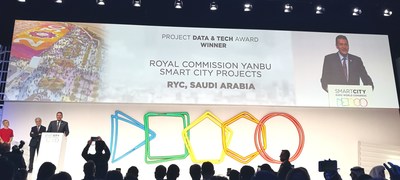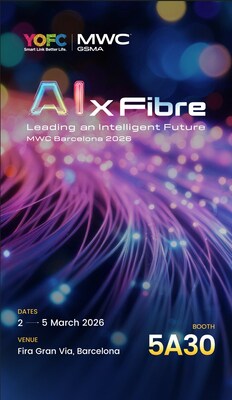Huawei Customers Win Prestigious Awards at Smart City Expo World Congress 2017
Press Releases
Nov 16, 2017
BARCELONA, Spain, Nov. 15, 2017 /PRNewswire/ — Four Huawei customers were recognized for their outstanding Smart City achievements and have won or were finalists for esteemed awards at the Smart City Expo World Congress 2017 (SCEWC). Shenzhen in China won the Safe City Award with its Smart Transportation project, and Yanbu in Saudi Arabia won the Data and Technology Award with its Smart City project. In addition, Weifang in China was one of the finalists for the City Award with its Smart City 3.0 project, while Cameroon was nominated for the Innovation Idea Award with its solar energy project. These cities have all leveraged Huawei’s Smart City solutions customized to meet city management needs across different regions and at different levels of development. The solutions drive digital transformation to improve city administration, create sustainable economies and enable efficient public services.
With 309 entries from 58 countries for this year’s World Smart City Awards, the competition is greater than ever, reflecting the diversity and innovation of Smart City development across the world.
Yan Lida, President of Huawei Enterprise Business Group, said: “The ultimate goals of a Smart City are to enable good governance, promote industry development and deliver benefits for the people. Together with our customers and partners, we are moving towards achieving these goals by improving city governance and service capabilities, helping to develop the local economy and stimulate innovation, and making cities more livable. Drawing from the world’s best Smart City practices, we have found that success is driven by Smart City development being a priority for the government, having a strong and capable Smart City project team, long-term and stable investment, and working with a leading digital partner that helps design top-level plans to address governmental needs and has an open and robust ecosystem. We are honored that Huawei has gained the trust of our customers and become their preferred partner for Smart City development. Leveraging leading new ICT such as cloud computing, the Internet of Things (IoT) and Artificial Intelligence to build a unified IoT platform, communications platform, cloud data center and smart command center, Huawei creates a nervous system for a Smart City, which enables the Smart City to become a living organism that grows sustainably and constantly evolves. We would like to congratulate Shenzhen and Saudi Arabia on receiving World Smart City Awards 2017, and we look forward to working with more cities to help them realize their Smart City dreams.”
Safe City Award winner: Shenzhen Traffic Police – Global-First All-Scenario Intelligent Transportation Solutions Helps Building “Traffic Brain” for Cities
Shenzhen Traffic Police worked with Huawei to create the city’s traffic system and ensure the safety of the city. Huawei helped Shenzhen Traffic Police by creating a top-level design and a comprehensive plan designed to improve the city’s transportation capacity, reduce traffic accidents and guarantee drivers’ safety.
The Traffic Police leveraged a Big Data platform that comprises a data resource pool and a deep learning system to build the city’s “traffic brain”, which has improved city traffic flow visibility and adaptive control of traffic lights, enhancing road capacity by 8%. The unified Big Data platform centrally processes traffic data to enhance data usage by 200%, and the Artificial Intelligence (AI) application assists law enforcement, raising the image recognition rate 10-fold to increase traffic violation processing. This greatly eases traffic congestion in the city, enhancing drivers’ travel experience.

Data and Technology Award winner: Royal Comission Smart City Project
In 2016, Saudi Arabia launched Vision 2030 strategy, which is built around three themes: a vibrant society, a thriving economy and an ambitious nation. Especially making the city sustainable development is one of the key goals. In support of Yanbu’s digital transformation into the nation’s first Smart City under this Vision, Huawei deployed a comprehensive optical network to cover all residential communities, enterprise campuses, and the key public areas in the city. In addition, Huawei works with its partners to offer Yanbu many smart applications, such as smart parking, smart weighing, smart rubbish bins, smart energy management, smart streetlight, stadium crowd analysis, and smart manhole cover. These applications significantly increased the city’s management efficiency, for example, reducing road maintenance costs by 20%, cutting down public lighting costs by 30%, and raising trash disposal efficiency by 30%. Additionally, the Royal Commission for Yanbu worked with Huawei to build an Integrated Communication Platform (ICP), the city’s management system. This system consists of an IoT data platform, Big Data platform, information integration platform, and converged command center. The ICP assists Yanbu in intelligent public infrastructure management, emergency response, and smart policing, optimizing city administration.

City Award finalist: Innovative Smart Weifang Improves Social Wellbeing
Based on the principle of “Centering on Humans and Driven by Innovation,” Weifang City has leveraged Big Data, cloud computing, mobile Internet, and other new technologies to launch the Smart Weifang 3.0 project. This project builds “eyes” to sense the real-time status of city operations, and a “brain” for smart dispatch. A number of innovations, such as “WeiV” app, VPai city pass, and smart city operation center, deliver real-time, refined, and intelligent public services and city management functions. Weifang worked with Huawei to build an IoT city awareness network based on NB-IoT technology. The network uses the “One Network, One Platform, and N Applications” development model to enable unified IoT terminal access, device management, and data collection. Weifang leverages this network to provide various innovative services for its residents and enterprises, such as smart nursing, smart streetlight, smart parking, and smart agriculture. These applications effectively converge the latest, high-value IoT data from across the city in real time, serving as the city’s important sources of Big Data.
Innovation Idea Award finalist: Microgrid Solar Plant Help Cameroon To Improve the Livelihood and Boost the Economic Development
Cameroon adopted Huawei’s innovative Microgrid Solar Plant solution to replace traditional power supply solutions that involve the development of mid- and high-voltage power grids and hydropower stations. The new power plant solution supports fast deployment, requires low investment costs, and helps the local government achieve rural electrification. The project drove the development of multiple local industries, such as education, medical treatment, communications, and manufacturing. To date, the project has greatly improved the development of the local society, by bringing electricity to 166 rural villages serving 120,000 residents, increasing local children’s school enrollment rate, and creating more than 1,000 job opportunities. Huawei’s off-grid power metering system also helped power operators solve the problem of how to collect electrical fees, achieving sustainable operations.
As the industry’s only ICT solution provider that can offer end-to-end cloud-pipe-device solutions, Huawei is committed to connecting the physical and digital worlds in cities and building Smart City nervous systems. Huawei actively participates in building open platforms and ecosystems to drive innovation, continuously grows together with partners and customers, provides customers with top-level Smart City designs, and helps its customers implement Smart City solutions. At present, Huawei’s Smart City solutions are serving more than 40 cities in over 120 countries around the globe.
View original content with multimedia:http://www.prnewswire.com/news-releases/huawei-customers-win-prestigious-awards-at-smart-city-expo-world-congress-2017-300557406.html
SOURCE Huawei



